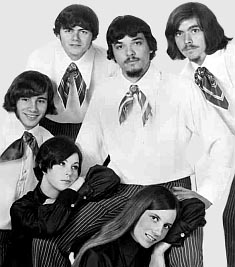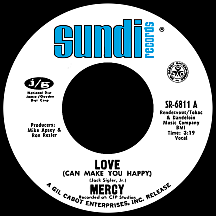MERCY
Love (Can Make You Happy)
Former disc jockey Gil Cabot started his Paris Tower record label around 1967, recording any bands in the Tampa, Florida area willing to shell out a few C-notes for several hundred 45s they could sell at local gigs. With his next label, Sundi, he made a more serious attempt at finding an act with hit potential. Jack Sigler, Jr., a recent high school graduate from the nearby city of Brandon, had been writing songs and singing with his group Mercy, which had as many as eight members at a time and usually included two or three female vocalists, making them unique among the era's pop bands. The group supplied Cabot with the big-money song he'd been longing for, but with it came a mass of confusion.
Carlos Zayas went by the stage name James (sometimes Jamie) Marvell and led a local band that recorded under three names...all over the course of a year! With bassist Buddy Good and drummer Roger Fuentes, singer-guitarist Marvell headed The Skopes, a sort of novelty/garage band responsible for the oddball tune "She's Got Bad Breath," released on the Chicago-based U.S.A. label in the summer of '67; Procter and Gamble had only recently established the Scope brand of mouthwash and wasted no time in pressuring the company to pull the plug on the single. Shortly afterwards, Marvell's group (which also included lead guitarist Paul Paris), had a single out as Surprize, then another as Together, both on the small Florida label Cent, owned by their manager, John Centinario. At the very least, the band delivered some clever (and solidly rocking) records, though none of them made much noise on the radio.
Jack's father had a friend, G.B. Roberts, who might loosely be considered a movie producer (for Americana Productions, a newly-formed and soon-to-be-defunct company). Roberts was shooting the ultra-low-budget Fireball Jungle in the Tampa area and Jack Jr. managed to get his band, identified in the credits as The Mercy Group, into a bar scene singing his romantic ballad "Love (Can Make You Happy)." The poorly-directed, poorly-acted, unintentionally guffaw-worthy racecar non-epic starred John Russell and former Wolf Man Lon Chaney, Jr. near the end of his career. It screened in very few theaters and disappeared almost immediately. A few Mercy members wandered off around this time, leaving Sigler, singer-keyboard players Brenda McNish and Debbie Lewis and lead guitarist Ronnie Caudill. Then former Surprize guys Marvell, Good and Fuentes came on board to make it a seven-person affair.

Cabot figured "Love (Can Make You Happy)" was the one good thing Fireball Jungle had going for it, so he pressed up some Sundi 45s with "Fire Ball," a fierce fuzz-guitar instrumental by Caudill (but credited to Mercy) on the flip side. In November 1968 the "Love" side got a little airplay down the road and around the bay at Sarasota's WYND. No other stations seemed interested. Jack joined the Navy, but Cabot didn't give up so easily. He cut a deal with Jamie/Guyden Records of Philadelphia for national distribution; the record broke first in Miami in early 1969, then Philly stations came on board due to Jamie's promotional efforts. Soon Jack's love song that rhymes 'air' with 'there, cares' and 'share,' was poppin' from coast to coast.
The single developed quickly that spring, rising to number two in May (unable to topple The Beatles and Billy Preston's "Get Back") and sailing past the one million sales mark shortly afterwards. While Sigler was off somewhere doing maneuvers, Cabot threw together an album with one or two of his family members and session players unconnected to the actual Mercy musicians and singers. The album's cover shows three models on the beach, leading fans to believe Mercy was a girl group. All the songs were mediocre covers of recent hits except "Love," the only track by the original band. To further bewilder, the group's name was shown on the cover as The Mercy. A fake group was assembled for touring purposes. Jack came home on leave and hit the roof.
The real band (Jack, Brenda, Debbie and Ronnie with James, Buddy and Roger) signed with Warner Bros.-Seven Arts. They were rushed into the studio to do a bona fide Mercy album with Brad Shapiro and Steve Alaimo taking the helm as producers. With Sundi controlling the original recording of "Love (Can Make You Happy)," they rerecorded it as close as possible to the sound of the original that was still in heavy rotation on many stations. The album's credit mentioned all seven members, but Sigler was on a tight schedule and returned to service as soon as the sessions were finished...without posing for the photo! A suitably sweet version of "Forever" (Buddy Killen's classic song that had been a hit for The Little Dippers and country singer Billy Walker in 1960 and again for Pete Drake and his Talking Steel Guitar in '64) became the follow-up single and quickly reached the charts in June '69 but fell off a month later. Another Sigler song, "Hello Baby," faltered from the get-go and Warners abruptly dropped the group. James Marvell and Buddy Good turned up on MGM a few years later as The Country Cavaleers. When Jack Sigler finished his Navy tour, he had no band to return to. In the decades since, he has performed with various singers and musicians under the Mercy name.


